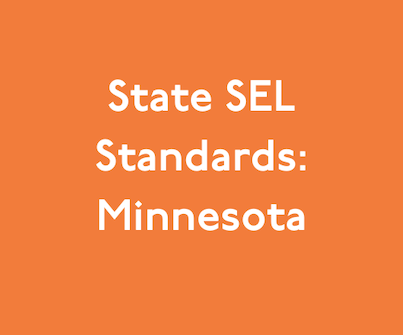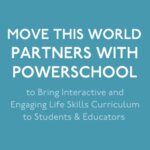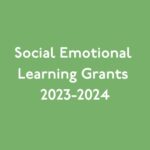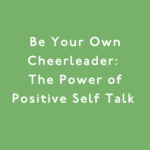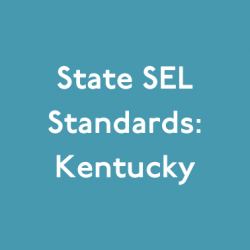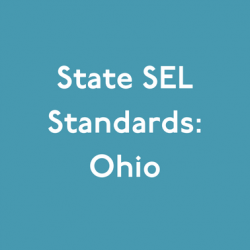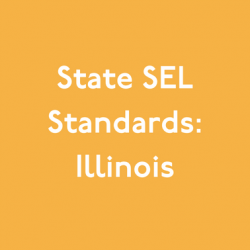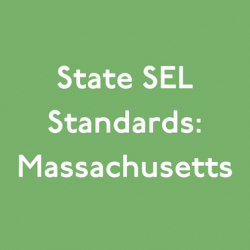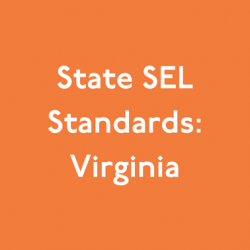In the most recent Minnesota Student Survey (2019), 13% of 5th graders reported feeling worried “a lot” in the last 30 days, and 41% of 5th graders indicated they had felt sad without knowing why. Even more alarming, 13% of 9th and 11th grade students reported they have seriously considered attempting suicide in the past year. Students in Minnesota need social and emotional support – not just for the future, but for their immediate day-to-day. The Minnesota Board of Education has provided guidance, support, and even adopted Minnesota SEL standards to support students.
See how Move This World aligns to Minnesota’s state SEL standards and guidelines by filling out the form below.
What do the Minnesota standards require?
Minnesota has adopted SEL standards for birth through age 5. Additionally, the Minnesota Board of Education has defined competencies and learning goals for K-12 aligned to the core social and emotional learning competencies defined by the Collaborative for Academic, Social and Emotional Learning (CASEL).
To highlight how Move This World can support Minnesota’s SEL competencies, we’ve provided you with the learning goals outlined by the Minnesota Board of Education along with some example objectives from Move This World’s curriculum.
Relationship Skills
Minnesota Learning Goals:
-
Demonstrates a range of communication and social skills to interact effectively.
-
Cultivates constructive relationships with others.
-
Identifies and demonstrates approaches to addressing interpersonal conflict.
Move This World Example Objectives:
-
Listen to others and respond respectfully.
-
Demonstrate appropriate ways to show appreciation to others.
-
Identify ways to build positive relations with peers.
-
Identify and use a variety of strategies to solve conflict.
-
Recognize the difference between positive and negative relationships.
-
Discuss stereotyping and its negative impact on others.
-
Develop strategies to request help from others and evaluate the effects of requesting help from others.
-
Develop strategies for handling jealousies and insecurities between friends.
Self-Awareness Skills
Minnesota Learning Goals:
-
Demonstrates an awareness and understanding of our own emotions.
-
Demonstrates awareness of personal strengths, challenges, aspirations and cultural, linguistic, and community assets.
-
Demonstrates awareness of personal rights and responsibilities.
Move This World Example Objectives
-
Recognize and label a variety of emotions.
-
Identify and describe how different situations make us feel.
-
Recognize how our emotions and behavior impacts others.
-
Describe and demonstrate ways to express emotions in an appropriate manner.
-
Measure progress towards goals.
-
Describe what motivates or hinders your efforts as a learner.
-
Describe your personal strengths and areas you’d like to develop.
-
Analyze how personal qualities influence choices and successes.
Self-Management Skills
Minnesota Learning Goals:
-
Demonstrates the skills to manage and express their emotions, thoughts, impulses, and stress in more effective ways.
-
Demonstrates the skills to set, monitor, adapt, achieve, and evaluate goals.
Move This World Example Objectives
-
Identify and explore appropriate strategies to manage emotions.
-
Communicate emotions safely and authentically using a variety of modalities.
-
Identify and control impulse behaviors.
-
Identify personal strengths and academic goals.
-
Demonstrate an awareness of how your behavior affects others.
-
List positive strategies for handling conflict.
-
Describe coping mechanisms for handling stress.
-
Develop a short-term plan to help you achieve your long-term goal.
Social Awareness Skills
Minnesota Learning Goals:
-
Demonstrates awareness of and empathy for individuals, their emotions, experiences, and perspectives through a cross-cultural lens.
-
Demonstrates awareness and respect of groups and their cultures, languages, identities, traditions, histories, and values.
-
Demonstrates awareness of how individuals and groups cooperate toward achieving common goals and ideals.
-
Demonstrates awareness of external supports and when supports are needed.
Move This World Example Objectives:
-
Identify and respond to the feelings of others.
-
Express empathy for others.
-
Recognize and accept the differences of other cultures and ethnicities.
-
Recognize and value that different people have different perspectives.
-
Identify verbal, physical, and situational cues that indicate how others may feel.
-
Identify unwelcome teasing or bullying behaviors.
-
Demonstrate how to express understanding of those who hold different opinions.
-
Define unhealthy peer pressure and evaluate strategies for resisting it.
Responsible Decision Making
Minnesota Learning Goals:
-
Considers ethical standards, social and community norms and safety concerns in making decisions.
-
Applies and evaluates decision-making skills to engage in a variety of solutions.
Move This World Example Objectives:
-
Identify positive behaviors that contribute to personal and community wellbeing.
-
Describe characteristics of a situation that make it feel safe or unsafe.
-
Describe what you can learn from a mistake.
-
Consider ethical, safety, and societal factors in making decisions.
-
Generate alternative solutions and evaluate their consequences for a range of academic and social situations.
-
Determine the extent to which your own decisions and behavior contribute to stress and come up with a plan for changing that decision.
-
Evaluate how honesty, respect, fairness, and compassion enable one to take the needs of others into account when making decisions.
-
Evaluate strategies for resisting pressure to engage in unsafe or unethical activities.
Developing skills within self-awareness and self-management, social awareness and maintaining relationships, and responsible decision-making skills allows students to spend time exploring their interests and passions, set goals, learn to collaborate with diverse peers, develop habits of reflection, and learn to manage stress so they can navigate conflict and persist in the face of challenges. A student of Madison Elementary School in Michigan explains,
“We use those [Move This World] strategies when we’re angry, sad, or have any emotion we recognize. It helps us be successful.”
Move This World’s curriculum cultivates individual awareness and regulation early on, and grows with the students as they progress throughout the district to help develop skills and strategies related to social awareness, relationship building, and responsible decision making. To learn more about how Move This World can support your school or district, connect with our team here.
